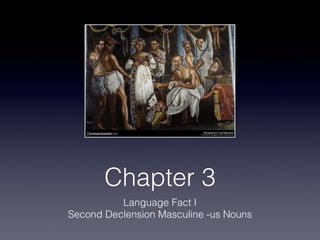Melden
Teilen
Downloaden Sie, um offline zu lesen

Empfohlen
Weitere ähnliche Inhalte
Was ist angesagt?
Was ist angesagt? (20)
Classes and morphological categories of pronouns in the Old English

Classes and morphological categories of pronouns in the Old English
Relative clauses-powerpoint-explanation-grammar close up unit 8

Relative clauses-powerpoint-explanation-grammar close up unit 8
Ähnlich wie Lnm chapter 3 ppt
Ähnlich wie Lnm chapter 3 ppt (20)
Speaking In English: A Discussion on the Parts of Speech

Speaking In English: A Discussion on the Parts of Speech
Lnm chapter 3 ppt
- 1. Chapter 3 Language Fact I Second Declension Masculine -us Nouns
- 2. We're Men! (mostly) Singular Plural Nom amicus amici Gen amici amicorum Dat amico amicis Acc amicum amicos Abl amico amicis
- 3. Language Fact II Second Declension Masculine -er, -ir nouns • Just check the genitive to see what the stem is • Use the stem to form everything but the nominative singular • Use the dictionary entry!!!
- 4. Language Fact III Genitive Case • "of ______" • Possessive "girl's" • is an adjectival modifier
- 5. Language Fact IV Vocative Case • Use as a form of address • Looks identical to the nominative Voc = Nom
- 6. Exceptions!! • Words that end is -us have a vocative of "e" • Words that end in -ius have a vocative of "i"
- 7. Language Fact V Prepositional Phrases
- 8. Examples Preposition + a noun (object of the preposition) prepositions are followed by the ablative (sometimes accusative) • in agris • cum amico • in via • in clivo • in casa
